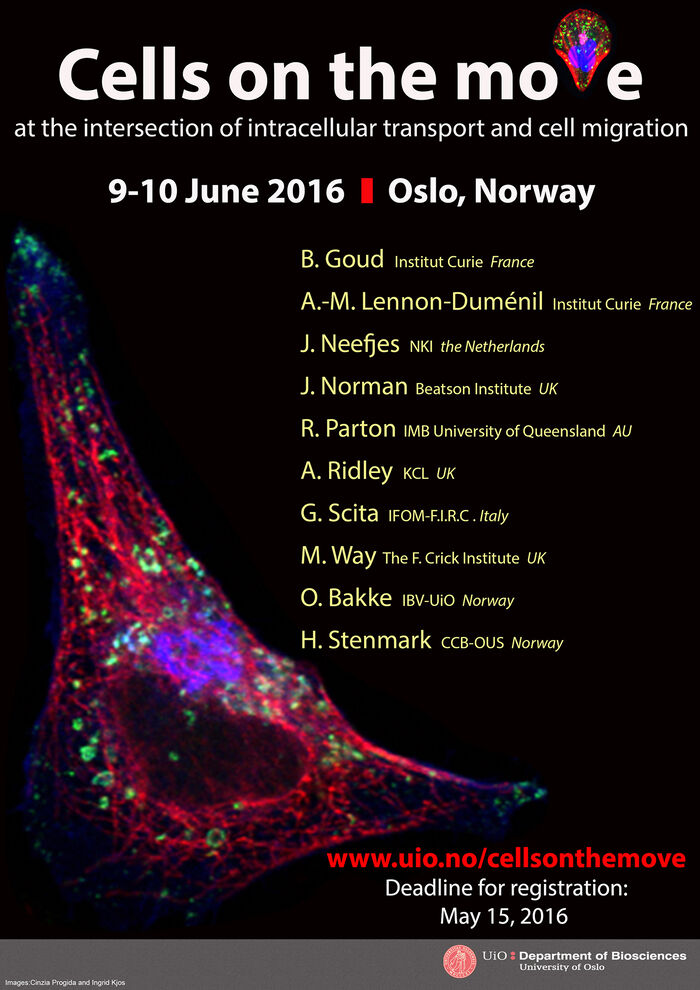Tidligere arrangementer - Side 93
Welcome to the opening of K.G. Jebsen Coeliac Disease Research Centre. The seminar is open to the public.
Andrea Cremaschi (earlier University of Kent, now UiO) will give a seminar in the lunch area, 8th floor Niels Henrik Abels hus at 14:15.
Bloch constructed higher cycle class maps from higher Chow groups to Deligne cohomology and étale cohomology. I will define a map from the motivic Eilenberg-Mac Lane spectrum to the spectrum representing Deligne cohomology in the motivic stable homotopy category over C such that it gives Bloch's higher cycle class map on cohomology. The map is induced by the map from Voevodsky's algebraic cobordism spectrum MGL to the Hodge-filtered complex cobordism spectrum defined by Hopkins-Quick. This extends a result of Totaro showing that the usual cycle class map to singular cohomology factors through complex cobordism modulo the coefficients of the Lazard ring MU^{2*} tensor_L Z. This is joint work with Amit Hogadi.
Yaozhong Hu (University of Kansas, USA) gives a lecture with the title: Rate of convergence and asymptotic error distribution of Euler approximation schemes for fractional diffusions
Olfa Draouil (University of Tunis El Manar, Tunisia) gives a lecture with the title: Optimal insider control of stochastic partial differential equations
Multi-index Monte Carlo and Multi-index Stochastic Collocation
The seminar has been cancelled due to personal circumstances.
Patrick Peter, Directeur de Recherche CNRS, IAP-Paris
In this talk I will present a paper by D. Bisch, R. Nicoara and S. Popa where continuous families of irreducible subfactors of the hyperfinite II_1 factor which are non-isomorphic, but have all the same standard invariant are constructed. In particular, they obtain 1-parameter families of irreducible, non-isomorphic subfactors of the hyperfinite II_1 factor with Jones index 6, which have all the same standard invariant with property (T).
Igor Barros Barbosa (PhD candidate at Department of Computer and Information Science at NTNU) gives a seminar on deep learning at Department of Mathematics on the 8th floor of Niels Henrik Abels hus.
By Stephanie M. Carlson
Amelie Neuville, Postodoctoral fellow with IRIS (International Research Institute of Stavanger), in collaboration with the University of Oslo, PGP group (Physics of geological processes)
Ritwik Mukherjee (TIFR) gives the Seminar in Algebra and Algebraic Geometry:
Title: Enumerative Geometry of singular curves in a Linear System
Abstract: Enumerative geometry is a branch of mathematics that deals with the following question: "How many geometric objects satisfy certain constraints". A well known class of enumerative question is to count curves in a linear system H^0(X,L) that have some prescribed singularities. In this talk we will describe a topological method to approach this problem. We will express the enumerative numbers as the Euler class of an appropriate bundle. We will then go on to explain how we compute the degenerate contribution of the Euler class using a topological method.
Guest lecture by professor Victor Zammit, Warwick Medical School, University of Warwick, Coventry, United Kingdom
Guest lecture by Professor Bruno Sarmento, Porto, Portugal.
By David Houle from Florida State University
Tom Ayres (Center for Astrophysics & Space Astronomy, University of Colorado at Boulder)
The Skolem Lecturer of 2016 will be Stewart Shapiro from Ohio State University
Dr. Nacira Agram (University of Biskra, Algeria) gives a lecture with the title: Stochastic optimal control of McKean-Vlasov equations with anticipating law.
Guest lecture by Dr. Christian Pfeifer, Christian Albrechts University, Kiel, Germany.
Sverre Holm, professor, Institutt for informatikk / Dept. of Informatics
John Christian Ottem, UiO, gives the Seminar in Algebra and Algebraic Geometry:
Title: Moduli of K3s via Global Torelli
Abstract: I'll give a brief account of the Torelli theorems and the construction of the moduli space of K3 surfaces
Abhik Ghosh (Dept. of Biostatistics, UiO) will give a seminar in the lunch area, 8th floor Niels Henrik Abels hus at 14:15.
We will have a new “mingle” meeting on Friday at 11.15 (as usual). The main attraction will be Ingunn Wehus and Signe Riemer-Sorensen.
Otherwise there will be updates from Kristine and Viggo on the running of the institute. But fear not, there will also be plenty of time for informal chat and eating of cake.
All are welcome to the lobby on the first floor.

